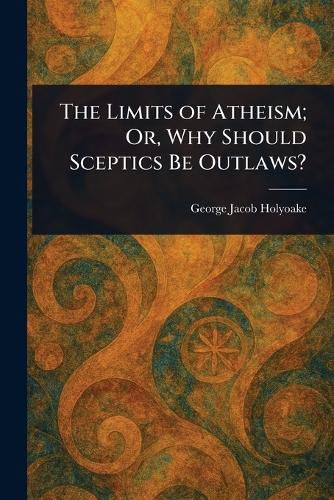Readings Newsletter
Become a Readings Member to make your shopping experience even easier.
Sign in or sign up for free!
You’re not far away from qualifying for FREE standard shipping within Australia
You’ve qualified for FREE standard shipping within Australia
The cart is loading…






This title is printed to order. This book may have been self-published. If so, we cannot guarantee the quality of the content. In the main most books will have gone through the editing process however some may not. We therefore suggest that you be aware of this before ordering this book. If in doubt check either the author or publisher’s details as we are unable to accept any returns unless they are faulty. Please contact us if you have any questions.
"The Limits Of Atheism: Or, Why should Sceptics be Outlaws?" by George Jacob Holyoake is a powerful exploration of atheism, skepticism, and secularism, arguing for the ethical and moral standing of freethought. Holyoake, a prominent figure in the 19th-century secularist movement, challenges the societal prejudices faced by non-believers. He questions why those who doubt religious dogma should be considered outlaws or social pariahs.
This work delves into the intersection of atheism and ethics, advocating for a morality grounded in reason and humanism rather than religious doctrine. Holyoake examines the social implications of atheism, contributing to a broader understanding of the sociology of religion and the historical context of freethought. This meticulously prepared print edition offers readers a crucial perspective on the enduring debate surrounding faith, reason, and the place of skepticism in society.
This work has been selected by scholars as being culturally important, and is part of the knowledge base of civilization as we know it.
This work is in the public domain in the United States of America, and possibly other nations. Within the United States, you may freely copy and distribute this work, as no entity (individual or corporate) has a copyright on the body of the work.
Scholars believe, and we concur, that this work is important enough to be preserved, reproduced, and made generally available to the public. We appreciate your support of the preservation process, and thank you for being an important part of keeping this knowledge alive and relevant.
$9.00 standard shipping within Australia
FREE standard shipping within Australia for orders over $100.00
Express & International shipping calculated at checkout
This title is printed to order. This book may have been self-published. If so, we cannot guarantee the quality of the content. In the main most books will have gone through the editing process however some may not. We therefore suggest that you be aware of this before ordering this book. If in doubt check either the author or publisher’s details as we are unable to accept any returns unless they are faulty. Please contact us if you have any questions.
"The Limits Of Atheism: Or, Why should Sceptics be Outlaws?" by George Jacob Holyoake is a powerful exploration of atheism, skepticism, and secularism, arguing for the ethical and moral standing of freethought. Holyoake, a prominent figure in the 19th-century secularist movement, challenges the societal prejudices faced by non-believers. He questions why those who doubt religious dogma should be considered outlaws or social pariahs.
This work delves into the intersection of atheism and ethics, advocating for a morality grounded in reason and humanism rather than religious doctrine. Holyoake examines the social implications of atheism, contributing to a broader understanding of the sociology of religion and the historical context of freethought. This meticulously prepared print edition offers readers a crucial perspective on the enduring debate surrounding faith, reason, and the place of skepticism in society.
This work has been selected by scholars as being culturally important, and is part of the knowledge base of civilization as we know it.
This work is in the public domain in the United States of America, and possibly other nations. Within the United States, you may freely copy and distribute this work, as no entity (individual or corporate) has a copyright on the body of the work.
Scholars believe, and we concur, that this work is important enough to be preserved, reproduced, and made generally available to the public. We appreciate your support of the preservation process, and thank you for being an important part of keeping this knowledge alive and relevant.